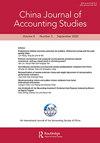税收执法与企业捐赠:来自中国“金税第三阶段”的证据
Q4 Business, Management and Accounting
引用次数: 3
摘要
摘要以“金税第三阶段”的实施为准自然实验,我们采用差异中的差异(DID)方法来检验税收技术的变化如何影响企业捐赠。具体而言,“金税三期”降低了民营企业的捐赠水平(−21.6%)。此外,在税收能力较低的地区和避税率较高的企业,处理效果尤其明显。额外的测试表明,加强税收执法减少了寻租捐款,而不是挤出市场化捐款,捐款的减少并不是因为现金流能力的恶化。总体而言,这些结果表明,税收技术的改进将限制寻租行为,规范企业的社会责任活动。本研究不仅丰富了税收执法和企业社会责任的相关研究,而且强调了信息基础设施建设的重大影响。本文章由计算机程序翻译,如有差异,请以英文原文为准。
Tax enforcement and corporate donations: evidence from Chinese ‘Golden Tax Phase III’
ABSTRACT Using the implementation of “Golden Tax Phase III” as a quasi-natural experiment, we take the difference-in-differences (DID) method to examine how changes in taxation technology affect firm donations. Specifically, “Golden Tax Phase III” has reduced the donation level of private enterprises (−21.6%). Moreover, the treatment effect is particularly pronounced in regions with low taxation capacity and enterprises with high tax avoidance. Additional tests show that enhanced tax enforcement decreases rent-seeking donations rather than squeezes out market-oriented donations, and the reduction of donations is not due to the deterioration of cash flow capacity. Overall, these results suggest that the improvement of taxation technology will restrict rent-seeking behaviour and regulate the corporate social responsibility activities of the enterprises. This study not only enriches the relevant research on tax enforcement and corporate social responsibility but also emphasises the significant impact of information infrastructure construction.
求助全文
通过发布文献求助,成功后即可免费获取论文全文。
去求助
来源期刊

China Journal of Accounting Studies
Business, Management and Accounting-Business, Management and Accounting (all)
CiteScore
0.70
自引率
0.00%
发文量
19
审稿时长
6 weeks
 求助内容:
求助内容: 应助结果提醒方式:
应助结果提醒方式:


